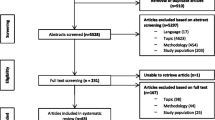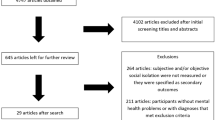Abstract
Family members have a considerable impact on the health and well-being of others in the family. The characteristics of family caregivers that relate to care recipients' positive and negative outcomes associated with chronic disease have received scant empirical attention. We reasoned that family caregiver social problem solving abilities would be associated with depression and life satisfaction reported by persons with congestive heart failure (CHF). Correlational analyses found that caregiver negative orientation toward solving problems was significantly predictive of higher depression and with decreased life satisfaction of persons with CHF. These findings indicate that family caregiver problem solving abilities are important factors in adjustment following CHF. Implications for clinical interventions and theoretical models of problem solving are discussed.
Similar content being viewed by others
REFERENCES
Allan, R., & Sheidt, S. (Eds.). (1996). Heart and mind: The practice of cardiac psychology.Washington, DC: American Psychological Association.
Altman, B. A., Cooper, P. F., & Cunningham, P. J. (1999).The case of disability in the family: Impact on health care utilization and expenditures for nondisabled members. The Milbank Quarterly, 77 ,39–73.
American Psychiatric Association. (1987). DSM-IIR: Diagnostic and statistical manual of mental disorders (3rd ed., Rev. ed.). Washington, DC: Author.
Beers, M. H., & Berkow, R. (Eds.). (1999). The Merck manual of diagnosis and therapy (17thed.).Whitehouse Station, NJ: Merck Research Laboratories.
Burman, B., & Margolin, G. (1992). Analysis of the association between marital relationships and health problems: An interactional perspective. Psychological Bulletin, 112 ,39–63.
Campbell, T. L., & Patterson, J. M. (1995).The effectiveness of family interventions in the treatment of physical illness. Journal of Marital and Family Therapy, 21 ,545–583.
Chang E.C. & D'Zurilla T.J. 1996. Relations between problem orientation and optimism, pessimism, and trait affectivity: A construct validation study.Behaviour Research and Therapy 34 185–194
Diener, E., Emmons, R., Larsen, R., & Griffin, S. (1985). The satisfaction with life scale. Journal of Personality Assessment, 49, 71–75.
D'Zurilla, T. J., Nezu, A. M., & Maydeu-Olivares, A. (2002). Social Problem-Solving Inventory-Revised (SPSI-R): Technical manual. North Tonawanda, NY: Multi-Health Systems.
Elliott, T. (1999). Social problem solving abilities and adjustment to recent-onset physical disability. Rehabilitation Psychology, 44 ,315–332.
Elliott, T., Grant, J., & Miller, D. (2004). Social problem solving abilities and behavioral health. In E. Chang, T. J. D'Zurilla, & L. J. Sanna (Eds.), Social problem solving: Theory, research, and training (pp. 117–134). Washington, DC: American Psychological Association.
Elliott, T., & Rivera, P. (2003). The experience of families and their carers in healthcare. In S. Llewelyn & P. Kennedy (Eds.), Handbook of clinical health psychology (pp. 61–77). Oxford: Wiley.
Elliott, T., Shewchuk, R., Miller, D., & Richards, J. S. (2001). Pro-files in problem solving: Psychological well-being and distress among personas with diabetes mellitus. Journal of Clinical Psychology in Medical Settings, 8,283–291.
Elliott, T., Shewchuk, R., & Richards, J. S. (1999). Caregiver social problem solving abilities and family member adjustment to recent-onset physical disability. Rehabilitation Psychology, 44 ,104–123.
Elliott, T., Shewchuk, R., & R ichards, J. S. (2001). Family caregiver social problem-solving abilities and adjustment during the initial year of the caregiving role. Journal of Counseling Psychology, 48 ,223–232.
Elliott, T., & Shewchuk, R. M. (2000). Problem solving therapy for family caregivers of persons with severe physical disabilities. In C. Radnitz (Ed.), Cognitive-behavioral interventions for persons with disabilities (pp. 309–327). Northvale, NJ: Jason Aronson.
Elliott, T., & Shewchuk, R. M. (2004). Family adaptation in illness, disease, and disability: Implications for research, policy, and practice. In J. Racynski, L. Bradley, & L. Leviton (Eds.), Health and behavior handbook (Vol. II).Washington, DC: American Psychological Association Press.
Elliott, T. R., & Shewchuk, R. M. (2003). Social problem-solving abilities and distress among family members assuming a caregiving role. British Journal of Health Psychology, 8 ,149–163.
Fiscella, K., Franks, P., & Shields, C. G. (1997). Perceived family criticism and primary care utilization: Psychosocial and biomedical pathways. Family Process, 36 ,25–41.
Fiske,V., Coyne, J., & Smith, D. A. (1991). Couples coping with myocardial infarction: An empirical reconsideration of the role of overprotectiveness. Journal of Family Psychology, 5 ,4–20.
Frank, R.G., Chaney, J., Shutty, M., Clay, D., Beck, N., Kay, D., et al. (1992). Dysphoria: A major factor of depression in persons with disability or chronic illness. Psychiatry Research, 43 ,231–241.
Franks, P., Campbell, T. L., & Shields, C. G. (1992). Social relationships and health: The relative roles of family functioning and social support. Social Science and Medicine, 34 ,779–788.
Grant, J., Elliott, T., Weaver, M., Bartolucci, A., & Giger, J. (2002). A telephone intervention with family caregivers of stroke survivors after hospital discharge. Stroke, 33, 2060–2065.
Heppner, P. P. (1988). A manual for the problem solving inventory. Columbia, MO: University of Missouri.
Heppner, P. P., & Krauskopf, C. J. (1987). An information processing approach to personal problem solving. The Counseling Psychologist, 15 ,371–447.
Koenig, H.G. (1998). Depression in hospitalized older patients with congestive heart failure. General Hospital Psychiatry, 20(1),73–96.
Manne, S. L., & Zautra, A. J. (1989). Spouse criticism and support: Their association with coping and psychological adjustment among women with rheumatoid arthritis. Journal of Personality and Social Psychology, 56 ,608–617.
Maydeu-Olivares, A., & D'Zurilla, T. J. (1996). A factor analytic study of the social problem solving inventory: An integration of theory and data. Cognitive Therapy and Research, 20 ,115–133.
Moser, D. K., & Dracup, K. (1996). Anxiety early after myocardial infarction associated with subsequent ischemic and arrthymic events? Psychosomatic Medicine, 58 ,395–401.
Nezu, A. M., Nezu, C., F elgoise, S. H., McClure, K. S., & Houts, P. (2003). Project genesis: Assessing the efficacy of problemsolving therapy for distressed adult cancer patients. Journal of Consulting and Clinical Psychology, 71 ,1036–1048.
Nezu, A. M., & Perri, M. G. (1989). Social problem solving therapy for unipolar depression: An initial dismantling investigation. Journal of Consulting and Clinical Psychology, 57, 408–413.
Profant, J., & Dimsdale, J. E. (2000). Psychological factors and congestive heart failure. International Journal of Behavioral Medicine, 7(3), 236–255.
Sadowski, C., Moore, L. A., & Kelly, M. L. (1994). Psychometric properties of the social problem-solving inventory (SPSI) with normal and emotionally-disturbed adolescents. Journal of Abnormal Child Psychology, 22 ,487–500.
Shewchuk, R., & Elliott, T. (2000). Family caregiving in chronic disease and disability: Implications for rehabilitation psychology. In R. G. Frank & T. Elliott (Eds.), Handbook of rehabilitation psychology (pp. 553–563). Washington, DC: American Psychological Association Press.
Shewchuk, R., Johnson, M., & Elliott, T. (2000). Self-appraised social problem solving abilities, emotional reactions, and actual problem solving performance. Behaviour Research and Therapy, 38 ,727–740.
Simon, H. (Ed.). (1999). Congestive heart failure. New York: Nidus Information Services. Retrieved April 27, 2000, from http://www.my.webmd.com/content/dmk/dmk article400018
Wagner, E. H., Austin, B. T., & Von Korff, M. (1996). Organizing care for patients with chronic illness. The Milbank Quarterly, 74 ,511–544.
Zimmerman, M., & Coryell, W. (1987). The Inventory to diagnose depression (IDD): A self-report scale to diagnose major depressive disorder. Journal of Consulting and Clinical Psychology, 55 ,55–59.
Zimmerman, M., Coryell, W., Corenthal, C., & Wilson, S. (1986). A self-report scale to diagnose major depressive disorder. Archives of General Psychiatry, 43 ,1076–1081.
Zimmerman, M., Coryell, W., Wilson, S., & Corenthal, C. (1986). Evaluation of symptoms of major depressive disorder: Selfreport vs. clinicians ratings. Journal of Nervous and Mental Disease, 174 ,150–153.
Author information
Authors and Affiliations
Rights and permissions
About this article
Cite this article
Kurylo, M., Elliott, T.R., DeVivo, L. et al. Caregiver Social Problem Solving Abilities and Family Member Adjustment Following Congestive Heart Failure. Journal of Clinical Psychology in Medical Settings 11, 151–157 (2004). https://doi.org/10.1023/B:JOCS.0000037609.23007.24
Issue Date:
DOI: https://doi.org/10.1023/B:JOCS.0000037609.23007.24




